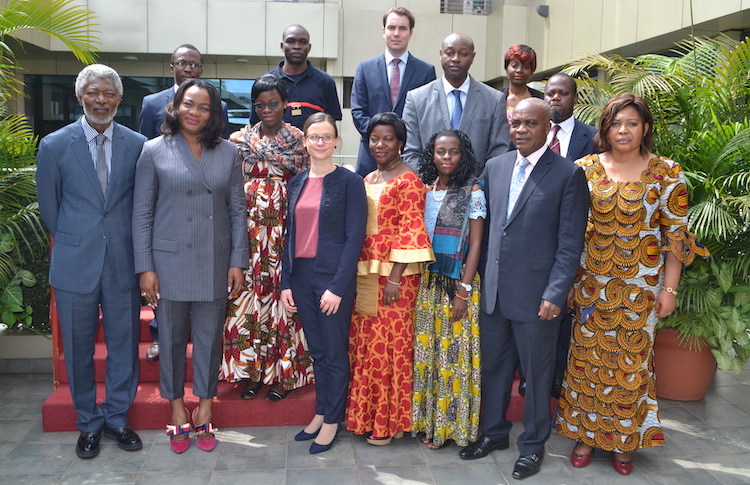
By Ronald Joshua
GENEVA (IDN) – The activities funded by the European Union are making a difference on the ground and are helping countries to develop their capacities against the threat of proliferation of biological weapons by States or non-States actors.
This was one of the conclusions at an EU side event that was organised in the margins of the annual meeting of the Biological Weapons Convention (BWC) in Geneva in December 2018 to present project activities under the EU Council Decision 2016/51 in support of the Convention.
“Our aim is to promote universal adherence to this important Convention and support States Parties in their efforts to implement their obligations,” said Anne Kemppainen, Head of the Political Section for Disarmament and Non-Proliferation at the EU Delegation in Geneva who moderated the panel discussion.
Anja Kaspersen, Director of the Geneva Branch of the UN Office for Disarmament Affairs, expressed appreciation for the EU’s support that has enabled the BWC’s Implementation Support Unit (ISU) to promote universalisation and national implementation.
It was pointed out that since 2006, the EU has provided 6.3 million Euros (more than 7 million USD) from its Common Foreign and Security Policy (CFSP) budget for BWC related legislative assistance, biorisk management, and export control in third countries.
The EU’s universalisation activities have contributed to the accession of 26 States to the BC. With the financial support of the EU, the ISU has developed an electronic facility increasing the rate of annual submissions of Confidence-Building Measures by States Parties.
More than 30 workshops have been organized in different parts of the world to promote universalization, national implementation, and submission of Confidence-Building Measures under the BWC.
Against this backdrop, the United Nations Office for Disarmament Affairs (UNODA) marked on February 9, 2019 the successful conclusion of European Union Council Decision 2016/51 in support of the Biological Weapons Convention as part of the EU Strategy against Proliferation of Weapons of Mass Destruction.
BWC is the first multilateral disarmament treaty banning the development, production and stockpiling of an entire category of weapons of mass destruction. It was opened for signature on April 10, 1972 and entered into force on March 26, 1975.
The main objectives of the EU Council Decision 2016/51 included promoting universal adherence to the BWC, enhancing the interaction between the BWC process and non-governmental stakeholders such as the scientific community; developing the capacity of BWC States Parties to implement the Convention; and supporting the preparations for the Eighth BWC Review Conference in 2016.
In the run-up to the successful conclusion of the 2016 Decision, the European Union adopted on January 21, 2019 Council Decision 2019/97 to succeed Decision 2016/51 and build on the momentum and progress achieved. The new Decision provides USD 3.4 million over three years to support BWC implementation and prepare for the Ninth BWC Review Conference in 2021.
The 2016/51 Decision was adopted on January 18, 2016 and the Geneva Branch of UNODA and the BWC Implementation Support Unit managed its implementation on the international, regional and national levels. The Decision was the fourth such instrument adopted by the European Union since 2006 and provided USD 2.34 million in support of the BWC.
The implementation of the Decision entailed the organisation of regional universalisation workshops for the Pacific, the Horn of Africa, and sub-Saharan Africa, as well as a dedicated universalisation visit to Haiti. Over the course of the implementation of the Decision, Côte d’Ivoire, Angola, Dominica, Vanuatu, Liberia, Guinea, Nepal, Samoa, the State of Palestine, Niue and the Central African Republic joined the BWC, and Tanzania began its ratification process.
In addition, four regional workshops were conducted throughout 2016 to prepare for the Eighth BWC Review Conference, and five regional science and technology workshops took place during 2017 and 2018 in order to discuss the implications of advances in the life sciences on the BWC.
Under the Decision, capacity development support was provided to nine States Parties, which received legislative, awareness-raising, strategic trade, and biosafety/biosecurity assistance: Cameroon, Colombia, Côte d’Ivoire, Iraq, Lebanon, Malawi, Malaysia, Nepal and Sierra Leone. Experts from these States Parties were also supported to participate in BWC meetings in Geneva. The Decision also co-funded a Peer Review Exercise in Morocco in 2017. [IDN-InDepthNews – 25 February 2019]
Photo: BWC Workshop in Cameroon. Credit: UNODA
IDN is flagship agency of the International Press Syndicate.
facebook.com/IDN.GoingDeeper – twitter.com/InDepthNews











